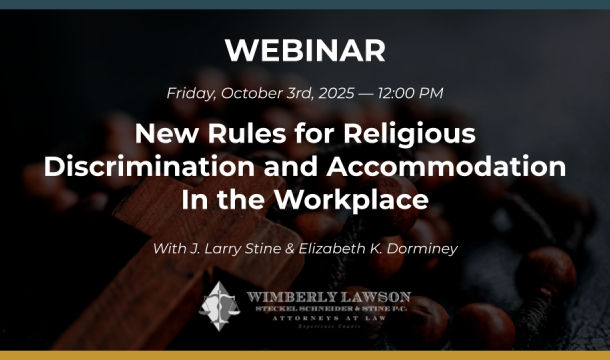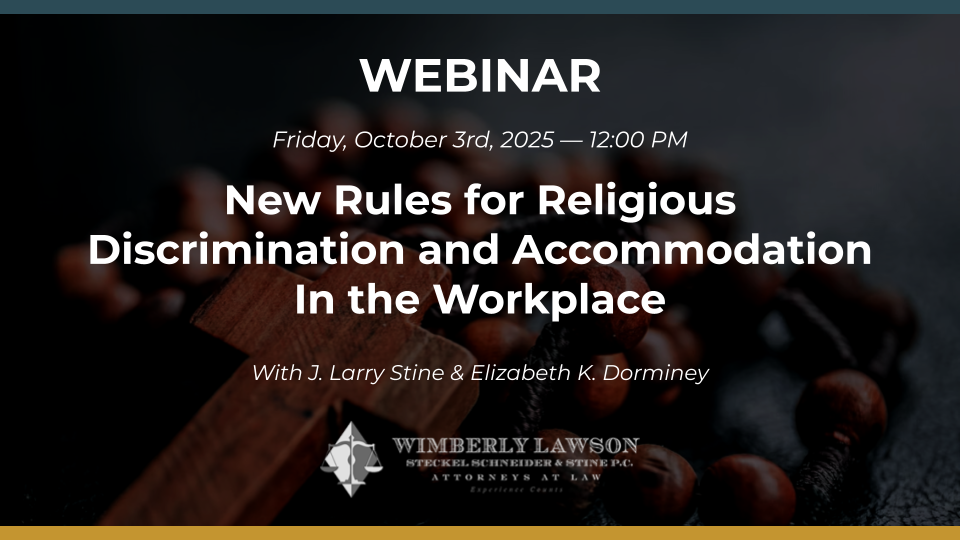RIGHT TO REPRESENTATION WHEN EMPLOYEE ORDERED TO TAKE DRUG TEST
A couple of recent cases from the National Labor Relations Board (NLRB) create additional issues for employers when unionized employees refuse to take drug tests, and/or demand some type of representation prior to taking such tests. Some 40 years ago the U.S. Supreme Court ruled in a case involving a unionized employer that, when an employee is questioned by the employer during an investigatory interview about a matter the employee reasonably believes could lead to discipline, such employee has the right to request and be provided union representation during such interview. NLRB v. J. Weingarten, Inc., 420 U.S. 251 (1975). The theory behind such a ruling was that a union employee has the right to the assistance of a union representative during such a disciplinary interview, and that such rights grow out of Section 7 of the National Labor Relations Act. At one point, the NLRB even extended such rights to a non-union employee requesting assistance of a co-worker during such a disciplinary interview, but, at the moment, the most recent NLRB precedent indicates that Weingarten rights do not apply to the non-union setting. IBM Corp., 341 NLRB 1288 (2004).
The right to representation during disciplinary interviews has been expanded to apply to drug testing. In late 2014, the NLRB reaffirmed that an employer violated the Labor Act by requiring an employee to submit to a drug and alcohol test, notwithstanding his request for representation, and by discharging him for his refusal to take the test without representation. Ralphs Grocery Co., 361 NLRB No. 9 (2014). The employer's argument was rejected that the refusal to take the test was grounds for discipline because it constituted both insubordination and an automatic positive test result. Since the employee's refusal to submit to the test without the benefit of representation is an exercise of his Weingarten rights, his refusal could not lawfully be used against him. The employer failed to prove that it would have disciplined the employee on the basis of his observed behavior for conduct before or during the meeting, as the employer relied solely on his refusal to submit to a test without the assistance of a representative.
A year later, the NLRB went a step further finding that Weingarten rights extend to allowing an employee to insist on having a union steward present during the drug or alcohol test itself. Manhattan Beer Distributors, LLC, 362 NLRB No. 192 (2015). The concept is that such a union presence would assist the employee in making sure proper screening protocols are followed. The case also discusses the principle that under some circumstances an employer must delay a test if necessary for a worker to obtain union representation.
In the future, employees in unionized facilities may have union representatives checking for whether appropriate drug testing procedures are followed, such as those promulgated by the United States Department of Transportation (DOT) in the transportation industry. The DOT suggests that the following flaws can invalidate a urinalysis: Specimen cups not pre-wrapped; specimen cups not unwrapped in worker's presence; worker not instructed to wash hands before urinating; specimen transferred from collection cup to retention cup out of worker's view; worker not asked to sign label on retention cup; specimen left unsecured; chain of custody (i.e., transmittal papers) not given to worker; and, independent medical review officer fails to call or meet with worker to go over test results.
A further concern is that Weingarten rights will be extended by the current NLRB to the non-union sector, so that even an employee at a non-union employer may request assistance of a co-worker during a disciplinary interview. It is likely that the current NLRB is looking for an appropriate case to address this issue, as the Board has been increasingly protective of employee and union rights. During the time period the Weingarten rights extended to the non-union sector, the cases only allowed representation by a co-worker, not by a non-employee, such as an attorney.
As to where union representation is required at a disciplinary interview because it is requested by the employee, the NLRB has held that even if a union representative is unavailable, the employer must give the employee time to obtain representation or, if it does not wish to give the employee this right, proceed on the basis of information it could obtain through other means. Thus, if an employee requests union representation before participating in a disciplinary investigation, the employer has three options: (1) grant the employee’s request; (2) give the employee the option of proceeding without representation; or (3) discontinue the interview and make a disciplinary decision based on the information it already has available.
Related Content
Get Email Updates
Recent Content

Trump Nominates Appointments to NLRB and EEOC but Policy Changes Likely to Be Delayed

DOL Launches Self-Audit Programs Designed to Help Employers Improve Compliance

DOL Must Release EEO-1 Reports to the Public under Open Records Laws

Current Advice on Active-Shooter Situations

New Policy for Federal Workers and Religious Expressions

